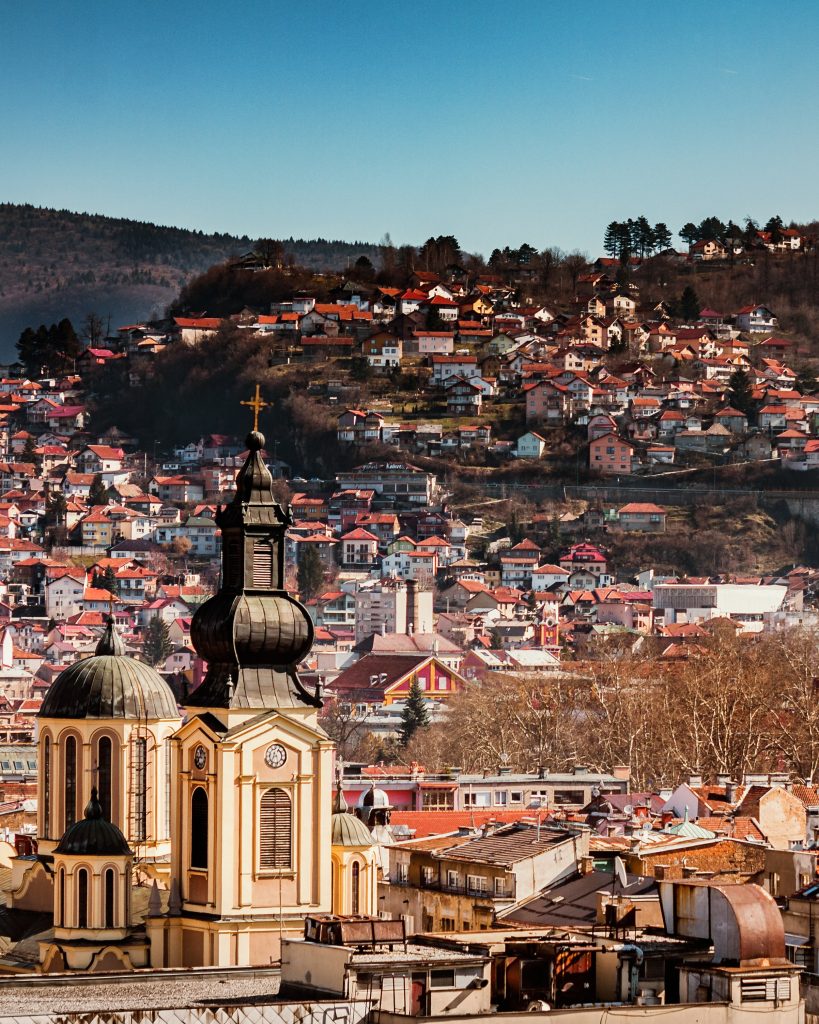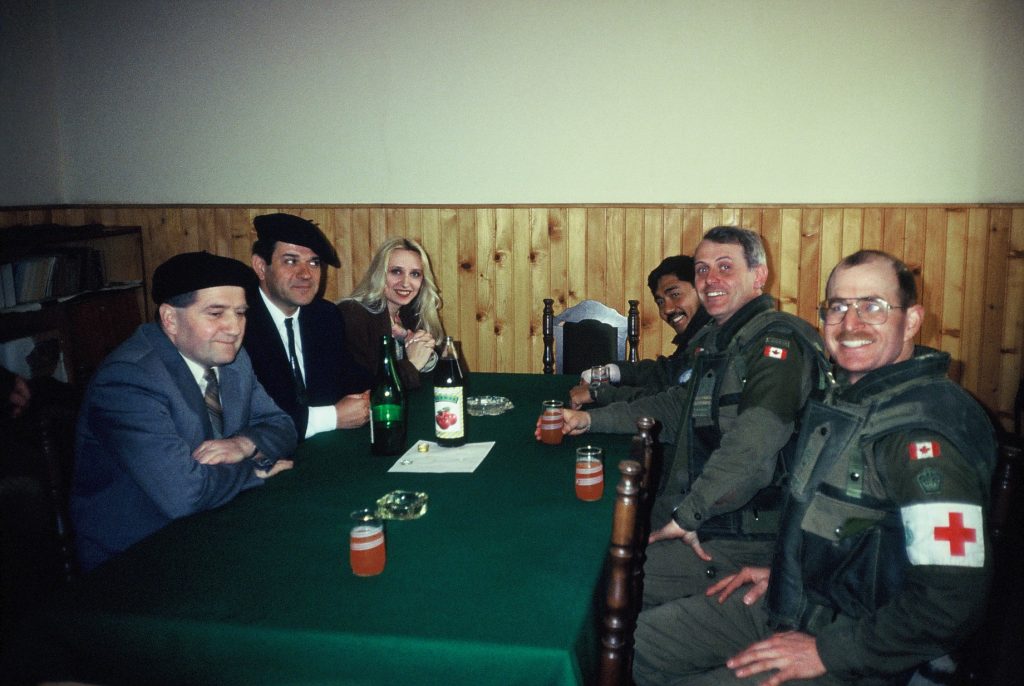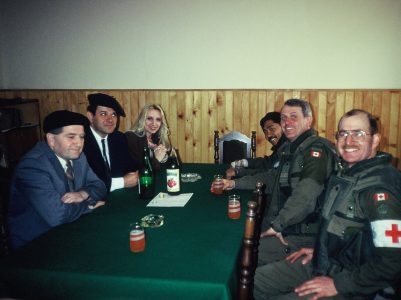By Steven K. Moore, PhD.
– – –
Maundy Thursday 1993 held for me one of the most extraordinary interfaith exchanges of my entire life.
I was a Padre with the newly deployed Canadian Contingent (United Nations Protection Forces [UNPROFOR]) on the outskirts of Sarajevo, capital of Bosnia and Herzegovina—a city under Serbian siege. Artillery and tank shelling had continued unabated for a year with snipers preying on Sarajevan civilians at will. With no peace to keep, we were tasked by the UN Security Council to provide security for contractors endeavoring to breathe life back into the city’s crumbling infrastructure as well as escort for Humanitarian Aid convoys resupplying designated Safe Havens. Two weeks in, I received an invitation for dialogue from the religious leaders of the local Bosniak Muslim community to be held in Visoko, a small town nearby.

Boundary Spanners, Bridging Separation
Upon arriving, I was ushered into the Visoko Imam Association conference room where five Imam awaited—leaders of the greater Muslim community, carefully selected for the occasion. Asim Azdahič was the Senior Imam and President of the Association, a body responsible for 60 mosques in the southwestern Sarajevo region. Over time I learned that Asim’s sole passion was to live in peace among his Croat Roman Catholic and Serbian Orthodox neighbours. He spoke of those who had risen to power in, what was then, Yugoslavia—leaders who attended to religion for personal and political gain. He longed for the days when their neighbourhoods would once again be multi-ethnic: sharing the same streets, stores, parks and councils.
I sensed then that Asim was one of those rare individuals, a middle-range actor, who was revered by the ordinary people at the grassroots, yet welcomed in the offices of the local leadership. As a leading Imam in greater Sarajevo, he had the capacity to reach across ethnic lines to his religious counterparts, creating bridges out of what had become barriers. He was a boundary spanner.
Present that afternoon was another Imam that, I am sorry to say, I only met on that one occasion. With his black boiled wool beret, snow-white hair, beard and piercing intelligent eyes, he listened to the conversation in complete silence for the first hour. Then it began—one of the most memorable exchanges I’ve ever had with a Muslim leader.
He broke his silence, and the interpreter began translating his question. All heads turned; all eyes were on him. I remember saying to myself, “Who is this man that has not so much as uttered a word for well over an hour, yet commands such respect when he chooses to speak?” I later learned that he was the religious éminence grise of the Muslim community: an Islamic scholar in his own right, speaking fluent Arabic, having memorized the entire Qur’an in its original language.
Spiritual Beings, Material Things
His query related to the state of western spiritual fervency … what was my experience with those who lived a superficial spirituality? The room was as quiet as a tomb as they awaited my response. Given that this was our first encounter with the local Muslim religious leadership, I intentionally kept my comments to generalities. I began by citing that for some decades Canada, and most other western nations, had enjoyed a very high standard of living, sustained by the accumulation of crippling debt. The other Imam nodded approvingly. I explained that due to our wealth, most people had all the comforts of life, seemingly placing their trust in material things. Many no longer felt any great need for God. Consequently, spiritual fervor had waned in the West; sizable segments of our populations no longer attended places of worship. It became very quiet as Mirella, my translator, and I seesawed our way through my response. Everyone was listening intently; heads continuingly nodding, Christian and Muslim alike.
Elucidating further, I related to them my belief that we were all spiritual beings created by God for communion with God. Gesturing with both hands, I pointed to myself and stated, “How could we as spiritual beings find inner satisfaction through material things? For that was not why we were created.” No one stirred while I spoke. I related that in recent decades many in the West, having lived in luxury with all of its material comforts, were testifying to a lingering emptiness. Numbers of these same people were finding their way back to God in search of a deeper meaning to life and, consequently, were finding answers to some of their inner hunger and emptiness. Once translated, the Imams spoke in whispers among themselves, waiting for the elder Imam to respond.
He quickly seized the moment, with Mirella translating in rapid succession. Leaning forward, smiling and looking deeply into my eyes, he stated that it was the same for the mosque. Once his people had the fancy clothes, the big house and the Mercedes, they no longer needed Allah or attended mosque. But after having lived that way for a period of time, many were making their way back, testifying that despite all of the pleasures they had enjoyed as rich Yugoslavs, they could only find contentment for their souls in Allah. The other Imams became a cacophony of approving voices, speaking animatedly among themselves.

Common Ground in a Safe Space
As the meeting adjourned, the elder Imam came to me with Mirella in tow. With everyone in rapt attention, he grasped my hand in a firm clasp and said, “You could be a Bosniak.” I made an approving gesture and we all laughed together. It was truly one of the greatest complements ever paid me. I never saw him again, something I regret not having done to this day. I often wonder what other conversations we might have had. Such is life in a war zone.
The common ground and spiritual connection that emerged that afternoon between a chaplain and the Muslim leadership gives witness to the safe space that hospitality creates with its engendered trust, kindness and sense of security. The relationship and trust established that day precipitated further dialogue and the facilitation by chaplains of eventual interfaith collaboration. Some months later, the leaders from all three faith groups came together (Croat Roman Catholic, Serbian Orthodox and Bosnian Muslim) for an Interfaith Celebration for Peace in the Canadian Compound—a witness of solidarity and fraternity for their respective communities during a time of intense internecine conflict.
A Time to Heal
Early encounters such as this led to the development of today’s chaplain operational capability known as Religious Leader Engagement. In operational environments globally, Canadian Armed Forces chaplains are engaging local religious leaders with a view to fostering relationships and bettering life for their respective communities. Whether offering humanitarian aid, participating in shared ritual, or, where conflict has left strained intercommunal relations, facilitating dialogue across ethno-religious boundaries, chaplains minister as agents of peace.
This emerging domain among military chaplains complements well Professor Alberto Melloni’s call for A Time to Heal as the theme of this year’s G20 Interfaith Forum in Bologna, Italy. Where openness to dialogue exists, the common ground that these spiritual leaders share serves to create opportunity for the beginning of healing. As such, they are indeed “…protagonists of a peaceful effort to mend the pandemics of war and hatred that still plague the world.”
– – –
S.K. (Steve) Moore, PhD has been a Padre in the Canadian Armed Forces for 22 years, with operational tours to Bosnia during the war (92-93), Haiti (97-98) and doctoral research in Kandahar, Afghanistan (2006). His post-doctoral work led to the chaplain operational capability, Religious Leader Engagement (RLE), now being integrated into military training. He has advanced RLE within NATO and the Commonwealth, increasingly assimilating a whole-of-government application—concepts now being adapted to the civilian sector. His publications include “Military Chaplains as Agents of Peace: Religious Leader Engagement in Conflict and Post-conflict Environments” (Rowman & Littlefield, 2013) and “Religious Leader Engagement as an Aspect of Irregular Warfare: the dénouement of a chaplain operational capability” (CANSOFCOM, 2020).


